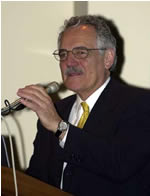AAMC president urges professionalism
In the face of mounting commercial and other pressures, physicians need to be mindful of a sense of professionalism, according to the president of the Association of American Medical Colleges.
Doctors who take advantage of their positions of trust with their patients or who become distracted by the lure of personal or financial gains harm the profession of medicine, said Dr. Jordan Cohen, during a speech March 28 at the Brody Medical Sciences Building. Cohen’s speech was the first in the Brody Distinguished Lectureship series, funded by the Sammy Brody Medical Scholars Program.

Dr. Jordan Cohen. Photo by Cliff Hollis.
“We read in the paper all the time about physicians who have abandoned their professional responsibilities,” Cohen said.
Cohen was at ECU as part of the Brody School of Medicine’s Medical Alumni Weekend. He discussed the work of the Medical Professionalism Project, of which he is a leader. The project, a joint effort involving U.S. and European internal medicine professional organizations, outlines nine areas that doctors should commit to:
Competency.
Honesty with patients.
Patient confidentiality.
Maintaining appropriate relationships with patients.
Scientific knowledge.
Professional responsibility.
Improving the quality of care.
Improving access to care.
Just distribution of resources.
Cohen said one way to maintain trust with patients is by managing conflicts of interest.
The need for professionalism in medicine was echoed later by Dr. Peter Kragel, interim dean of the Brody School of Medicine. “It’s vitally important that all physicians aspire to the highest level of professionalism and that we, as a school of medicine, teach our students professionalism and model professional behavior for our students,” Kragel said. “Medicine is about more than just business decisions; it’s about values and caring. Without professionalism physicians lose that distinction.”
Nevertheless, business decisions have crept into more areas of medicine than ever, with words like “physician,” “patient” and “cures” being replaced by “provider,” “customer” and “profits,” Cohen said. Physicians need to be wary of market influences, Cohen said, adding that the motto of marketing is “buyer beware,” while the Hippocratic Oath says, “First, do no harm.”
“The marketplace is the wrong paradigm for medicine,” Cohen said. Market forces divert resources from less profitable to more profitable endeavors, and is “poison for the poor,” he said.
Kragel agreed, but acknowledged that the pull of market and business forces is considerable. “Economic concerns and skyrocketing overhead make it more difficult for physicians to focus on professionalism in today’s world,” he said.
Even with today’s pressures, Kragel is confident that doctors are making the right decisions on matters of professionalism. “In my opinion the vast majority of physicians conduct themselves in a professional manner,” he said.
The AAMC is a non-profit association that represents the nation’s 125 medical schools and nearly 400 teaching hospitals. Cohen has recently spoken of the need to rebuild the country’s trust in the medical profession and to reengineer medical school admissions processes so that personal character is given as much weight as academic performance.
The Medical Alumni Weekend, traditionally held in the fall to coincide with the university”™s homecoming weekend and football game, was moved to the spring to better fit the schedules of most medical alumni. The reunion focused on the medical classes of 1982, 1983, 1987, 1988, 1992, 1993, 1997 and 1998.
The Medical Foundation of ECU organized the event.